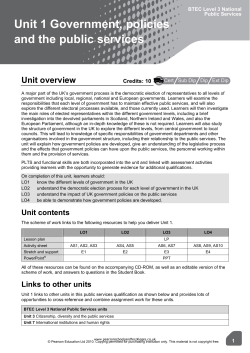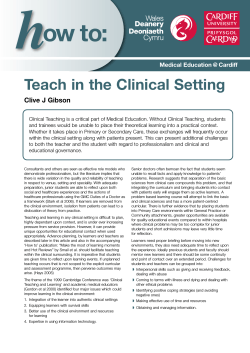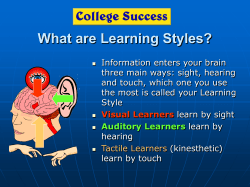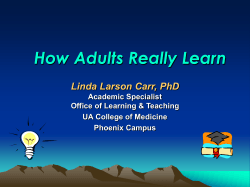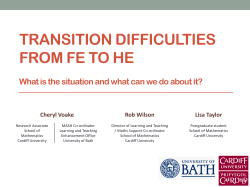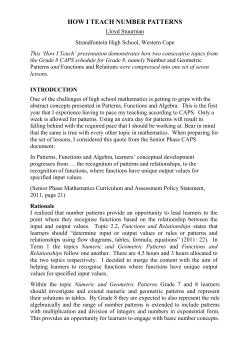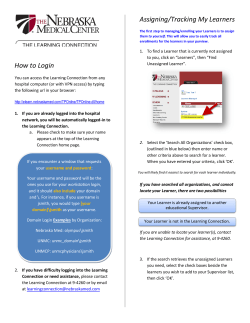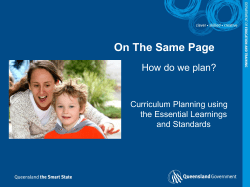
Improving teaching, learning and assessment Learning & Skills Conference 15 May 2013
Learning & Skills Conference 15 May 2013 Improving teaching, learning and assessment Overview To identify common problems and the key challenges To explore strategies to improve teaching, learning and assessment in your organisation To consider five achievable steps that you can take in the next three months to improve teaching, learning and assessment in your organisation | 2 Sir Michael Wilshaw….. “We have made the link between outstanding providers and outstanding teaching unequivocal in the revised Common Inspection Framework. We do not expect every lesson observed to be outstanding, but we do believe that the cumulative impact of high quality teaching and learning drives up learners’ progress and achievement.” Findings from inspections Positive features of learning sessions Enthusiastic and motivated staff: have high expectations of learners help learners to work collaboratively with other learners plan to meet all learners’ needs focus on learners’ vocational and subject expertise engage learners in stimulating and challenging learning activities using relevant & innovative resources use information learning technology successfully to help learners become more independent in their learning Intermesh on-and off-the-job learning activities - set relevant work to be completed on-the-job to support off-the-job learning The impact of this is Learners: develop strong communication skills gain a detailed understanding of their work, can explain ideas well, answer questions and confidently meet their customers’ needs produce work of a high standard, including work products, coursework and in examinations develop high levels of independence and can complete tasks set effectively Weak aspects of teaching and learning Poor attendance and punctuality. Lack of support for those who are struggling. Weak classroom management - not dealing with behaviour issues. Poor assessment that is not timely. Learners are not clear what they are meant to be doing, or the outcomes aimed for. Insufficient challenge for the most able. Weak teacher questioning – too superficial, not covering all learners, not extending and developing learning. Learners spend too long listening to the teacher/trainer and those who are not participating are not picked up. Weak aspects of teaching and learning Learning is not individualised with superficial planning. Feedback is insufficiently detailed and poor grammar and spelling is not always corrected. Provider lesson observation grades are often overgenerous because observers focus too often on teaching rather than learning. Performance management of teachers/trainers is weak and does not secure consistency in the quality of teaching and learning. The pace of learning is often too slow and learners are not challenged sufficiently in sessions or work or through target setting to realise their full potential. Key challenges and opportunities facing us What do you do? How can you rapidly improve teaching, learning and assessment in your organisation? Do your teachers/trainers/assessors outstanding? Do you focus extra resources to improve the quality of teaching, learning and assessment when success rates and other outcomes measures are below the provider target? Are you focusing on the right things? know what is good and How are you using performance management to bring about rapid improvement in teaching, learning and assessment? Do you know: How good the teaching is in every session? What progress learners are making and whether their progress is monitored properly? If learning interventions and coaching are good? How good the teaching is in maths and communication? If the assessment strategy is effective to improve the pace of achievement for each learner? Critical and uncompromising evaluation of teaching, learning and assessment Instilling a culture of quality improvement with a clear focus on teaching learning and assessment Towards good and outstanding teaching and learning Firm performance management to bring about rapid improvements in teaching learning and assessment Targeted, high priority training initiatives for underperforming staff Activities Activity 1: In your group consider: What are the most obvious areas for improvement in your provision that have stopped you being judged good for teaching, learning and assessment? What internal or external barriers have meant that you have not been able to resolve the weaknesses? What key strengths does your provision have that you can build on? Activity 2: Group task – put these issues into the order in which you would expect to tackle them to improve teaching, learning and assessment Progress monitoring Attendance and punctuality Additional learning support Tutor/trainer expertise Initial assessment Progress in off-the-job sessions English and mathematics Planning of off-the-job sessions Assessment/marking Assessment to inform learning Subject area management Quality workbooks/handouts ? Activity 3: The leadership challenge – do you have the capacity to improve? On a scale of 1 to 4 assess the capacity to manage change of: the senior leadership team the subject managers the teaching/training staff other staff the learners. How far do your answers align with the planning and priorities in your action plan? What actions can you take to strengthen your weakest teams? Activity 4: How would you performance manage these situations? Robert Elee is your head of communications and has been teaching for 20 years. The quality of teaching in his sessions is usually a grade 3-‘requires improvement’ and occasionally ‘good’ (according to your senior managers) but only more able learners make expected progress in his sessions. His planning tends to be ‘one size fits all’. You are the new Vice Principal curriculum recruited from another college. The quality manager is Jane Doe who was an unsuccessful applicant for the post. From your initial analysis of the observation of teaching and learning system you feel that Jane Doe’s observations are the weakest out of the whole team, and show signs of significant over-grading. Activity 5: Think about your own self assessment, action plan on teaching, learning & assessment Do these features of strong action planning appear in your plan? Having success criteria and measurable objectives that ensure good practice (at least) and which staff can be held accountable for. Setting a reasonable and appropriate timescale, given your capacity. Having actions in a sequence that reflects the reality of the provision. Having clear milestones by which to monitor progress. Identifying who has the skills and is accountable for delivering, monitoring and evaluating – and shares out the responsibilities. Clearly indicating roles of external agencies, the board of directors or governors and others. Performance management and professional development are both crucial in supporting improvement Robust performance management with clear and measurable targets for all staff + Targeted professional development, evaluated against impact on achievement So what priorities have you set for continuous professional development? Think about your own planning and identify what it means for the development of teachers/trainers. How providers successfully improve teaching, learning & assessment Skilled senior managers ensure that all middle managers are also effective at leading and monitoring teaching Frequent and rigorous diagnostic monitoring of teaching and learning Use evidence and engage staff in developing improvement plans Make use of identified best practice within the provision, for example, coaching Use other providers to share best practice and provide a vision of ‘outstanding’ Deliver high quality professional development Monitor the delivery and impact of initiatives – achieve consistency Targeted support and robust performance management where staff do not respond to change Activity 6: Is your lesson observation system effective? Internal/external observers Number observers – consistency Credibility of observers Reflect on your own system. Generic or subject specific What are the positives? Focus on learning Frequency To grade or not to grade Relevance of paperwork Moderation Activities during observations such as talking to learners, looking at portfolios, registers and assessment records What will you change to have the biggest impact? Activity 7: Improving communication and mathematics Discussion topic Teaching, learning and assessment: Do staff have the necessary qualifications, skills and experience to teach communication and mathematics effectively? Is learners’ work marked/assessed properly, do they receive constructive feedback and know how well they are doing? Does this support learners in understanding the purpose of studying these subjects? Are they able to apply their skills in a vocational and generic context? The qualifications: Are the qualifications offered the right ones for the learners? Are they at the correct level, and assessed in the most appropriate way and at the right time? Activity 8: improving communications and mathematics Discussion topic Who has responsibility for this? How well are data collected and used? Does this look at the effectiveness of different strategies and the success of different groups? Is self-assessment of communications and mathematics carried out separately or as part of each subject area? Are observations of teaching, learning and assessment carried out and how is the information from them used? Final Discussions How do you currently identify underperformance in subject areas? What action do you take once underperformance is identified? Do you feel your observation of teaching and learning process is sufficient to give you an accurate view on the standards of teaching, learning and assessment? How can you be sure? What will you do differently that would effect greater or more rapid improvement? Successful actions to improve teaching, learning and assessment Accurate self-assessment and clear action plan Accurate & honest feedback to teachers and trainers Effective monitoring of learning in sessions Robust monitoring of the quality of learners’ work to set high standards Identification and sharing of good practice Clear identification of actions for improvement Outstanding training for staff Effective use of data Strong focus on learning Having a vision – is it good enough? Good is the stepping stone to outstanding ? What would need to change at your provision to achieve this? www.ofsted.gov.uk
© Copyright 2025

